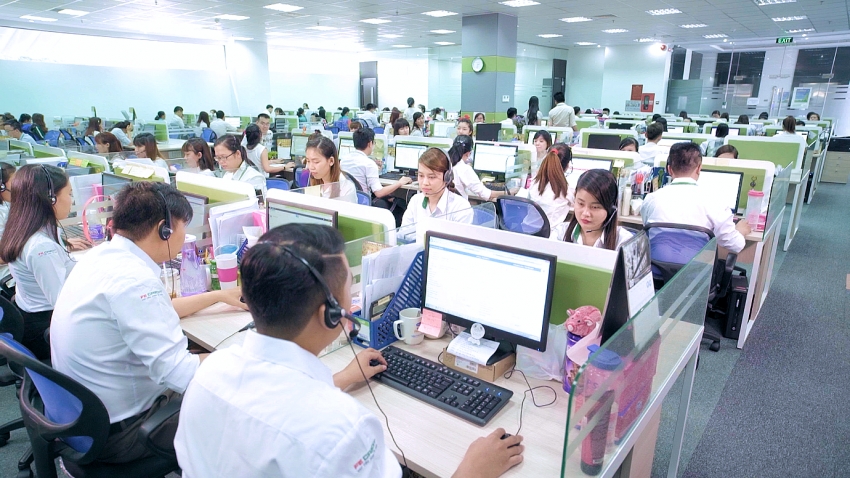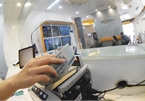Spring back
 |
Elsewhere around the globe, governments have only just begun easing coronavirus restrictions and reopening economic activities, while many are even mulling further lockdown measures to avoid a recurrence.
The story is rather different in Vietnam where schools and businesses have resumed after International Labour Day. Major cities once again see severe traffic congestions, but people seem to be handling it with far more grace than ever before the three-week national isolation order announced in early April.
As normal life resumes, retail sales of consumer goods and services in May has skyrocketed by almost 27 per cent against April’s figures (although it still fell some 5 per cent on-year) as per data from the General Statistics Office. The index of industrial production (IIP) for the month was also estimated to surge 11.2 per cent against the prior month. The number of new businesses registering for establishment rose by more than 36 per cent on-month and 0.3 per cent on-year.
Some optimistic retailers like Japanese fashion brand Uniqlo have gone one step further by expanding their presence in Vietnam as normalcy returns quickly here. The brand has just opened its fourth store in Ho Chi Minh City in this June. The company may well cope with the crisis better than its rivals, but more to the fact, it is taking a bet on Vietnam’s resilience and consumers’ willingness to spend on essentials and necessities.
As per Euromonitor International, the massive changes brought about by the pandemic are pushing consumers to re-evaluate their priorities, giving rise to new values and spending criteria. While older generations have now shifted to online shopping, younger consumers are stockpiling on staple products.
The sole silver lining
 |
As retail and production show signs of recovery, so does the banking and finance sector, thanks to government measures that aim at supporting businesses and individuals to weather the tough times, speeding up infrastructure investment and stimulating domestic spending.
From the early stage of the outbreak, a credit package worth some VND250 trillion ($10.8 billion) in the shape of lowered interest rates, repayment extension, and loan forbearance, was committed by commercial banks to aid businesses and individuals. The central bank, on the other hand, is set to inject liquidity to back lenders in their lending activities and addressing the issue of bad debts.
Lowering of interest rates, in particular, is expected to make borrowing easier and more affordable for both businesses and individuals. This, in turn, may work in favour of finance companies during the time of the crisis, when customers opt for these for the sake of quicker access to credit over traditional bank loans.
Those seeking fast access to credit to meet immediate living expenses will likely turn to reliable consumer finance firms. Others may choose to rely more on credit cards to take advantage of an interest-free overdraw period to temporarily make up for the lost or limited income.
Overall, customers in Vietnam were found generally more satisfied with their consumer finance experience, according to a 2019 survey by FiinGroup on customer satisfaction with consumer finance products.
Meanwhile, for the performance of the banking and finance sector in the first five months, some lenders seem to have managed the hardships well, with promising results. VPBank, for instance, announced its consolidated pre-tax profit (including FE Credit) of VND5.1 trillion ($221.74 million), achieving up to 50 per cent of its adjusted 2020 business target.
 |
Others also made ambitious plans for the year, betting big on the positive economic outlook in the second half. HDBank, in particular, expects its pre-tax profit to reach over VND5.66 trillion ($246 million), a 13 per cent increase on-year.
While uncertainties remain clouding the horizon, Vietnam is the only economy in the region where HSBC forecasts positive economic growth for 2020, and, according the HSBC EM Vulnerability Index, is the least vulnerable to macro-shocks.
The headwinds created by COVID-19 and the ongoing US-China trade tensions that are hurting so many other economies are believed by the bank to be turning into tailwinds for Vietnam. VIR
Trang Nguyen

Finance Ministry to loosen credit quota for securities
Ministry of Finance’s proposal to increase the quota for credit poured into the securities sector is largely backed by market experts.

VN Finance Ministry to set up research group on crypto currency
The Ministry of Finance has decided to set up a research group which would be in charge of studying and proposing policies to manage virtual assets and cryptocurrencies.